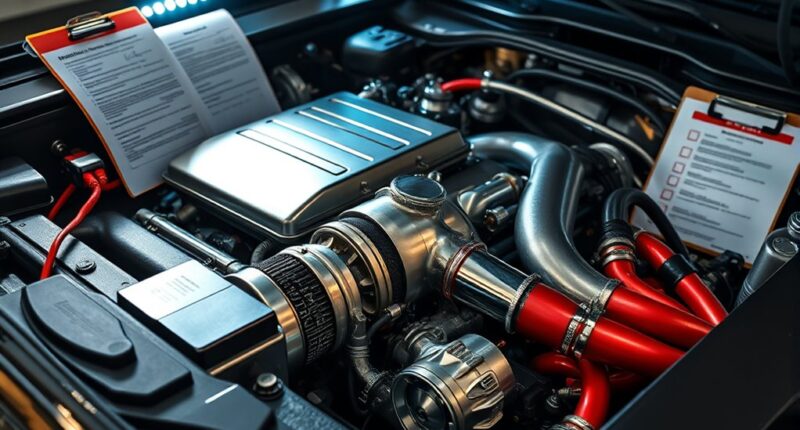When modifying your engine, you need to follow federal and state laws that protect emissions, safety, and noise standards. This means avoiding removal of emission controls, ensuring your parts are certified, and staying within legal decibel levels. Plus, your modifications could void warranties or lead to fines if not properly documented and compliant. To keep your vehicle legal and safe, it’s essential to understand these rules—more tips to help you stay compliant are just ahead.
Key Takeaways
- Comply with EPA and state emission standards; removing or disabling emission controls is illegal and can lead to penalties.
- Obtain necessary certifications, such as EPA or CARB approval, before installing aftermarket parts or making modifications.
- Ensure modifications do not violate local noise, safety, or vehicle operation laws requiring permits or reporting.
- Maintain detailed records of modifications, parts used, and compliance documentation to support legal and regulatory review.
- Be aware that warranties may be voided if modifications violate manufacturer guidelines or environmental regulations.
Understanding Federal Regulations on Engine Modifications
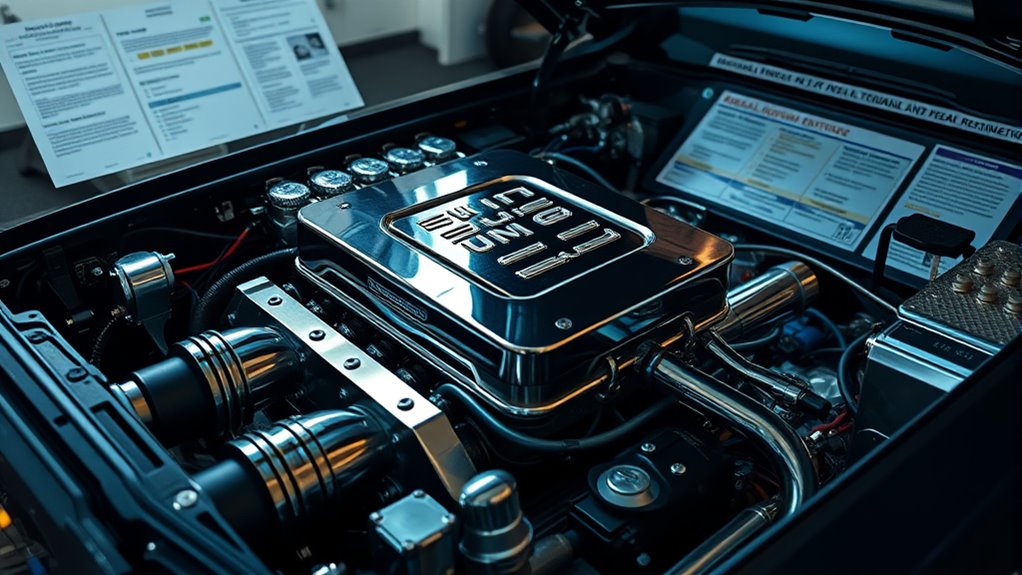
Federal regulations strictly govern engine modifications to guarantee vehicle emissions stay within legal limits. Under the Clean Air Act Section 203(a)(3), removing or disabling emission control devices before or after sale is prohibited. Violating this rule can lead to civil penalties—up to $25,000 for manufacturers and dealers, or $2,500 for individuals per violation. This law covers both road and nonroad engines. Enforcement includes criminal charges, especially for installing defeat devices designed to bypass emission controls. Manufacturers must keep certified configurations unless they follow explicit EPA guidelines for modifications. Post-use life modifications are allowed if properly documented and proven to reduce emissions without circumventing original design intent. Failing to maintain records risks being classified as tampering, which can attract penalties and legal action. Additionally, adherence to content quality and authority principles is essential to ensure compliance and credibility in engine modification practices. Understanding the regulatory environment, including the role of government agencies in enforcement, helps stakeholders avoid inadvertent violations and supports responsible modification practices. Staying informed about emission standards is crucial for compliance and avoiding legal repercussions. Regular consultation with legal experts can also help navigate complex regulations and prevent violations.
Navigating State Laws and Local Ordinances

Exploring state laws and local ordinances is essential to guarantee your engine modifications remain legal and avoid penalties. You need to verify your upgrades comply with EPA emissions standards and pass state emissions tests. Noise regulations limit how loud exhaust systems can be, so confirm local decibel limits. While slight power upgrades are generally allowed, excessive modifications or engine swaps often require special permits. Safety-related changes, like suspension or brake modifications, are tightly regulated or prohibited. Local laws may add restrictions on loud exhausts, lighting, or visual modifications like window tints. Some municipalities require reporting significant changes or offer temporary exemptions for events. Additionally, understanding emissions standards is crucial, as failure to follow these rules can lead to fines, vehicle impoundment, or insurance issues. It is also important to stay informed about inspection requirements to ensure compliance during vehicle inspections. Staying up-to-date with local regulations helps prevent inadvertent violations and ensures your vehicle remains roadworthy. Always check your state and local regulations before modifying your engine.
The Impact of Modifications on Vehicle Warranties
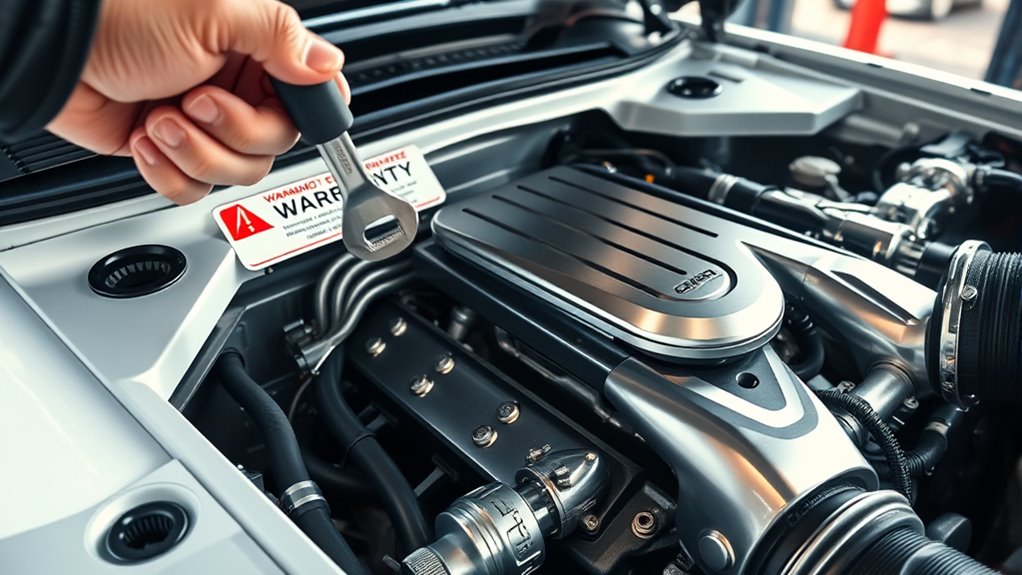
Modifying your vehicle can enhance performance and appearance, but it also risks voiding your warranty if you’re not careful. Under the Magnuson-Moss Warranty Act, manufacturers can’t blanket deny coverage for aftermarket parts unless they prove the modification caused the failure. However, many manufacturers enforce powertrain-focused restrictions, especially regarding ECU tuning and engine hardware upgrades like turbochargers, which often invalidate related warranties. Suspension or drivetrain mods may also jeopardize coverage of those systems. Always review your warranty contract for specific clauses about unauthorized modifications, and keep detailed records of professional repairs. Using manufacturer-approved parts and disclosing modifications when filing claims can help preserve coverage. Remember, manufacturers must prove that a modification directly caused a failure before denying warranty claims, but risks remain if you don’t adhere to policy guidelines. Additionally, being aware of asset division laws can be beneficial if you plan to modify your vehicle during a divorce settlement, as certain assets, including vehicles, may be subject to division. Furthermore, understanding vehicle modification regulations in your jurisdiction can help ensure your modifications are compliant with legal standards and won’t inadvertently lead to warranty disputes.
Compliance With Emission Standards and Certification
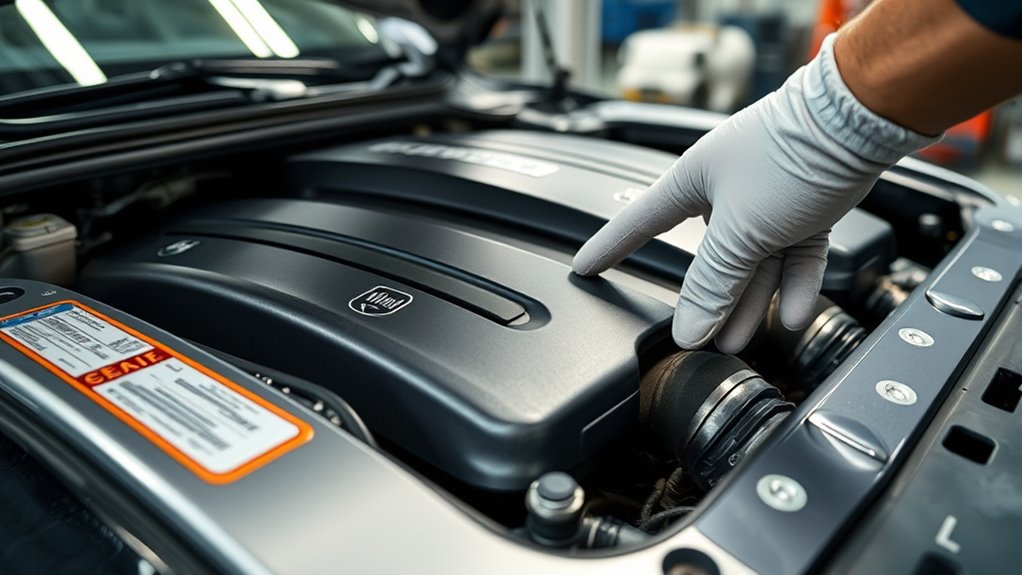
Ensuring your vehicle complies with emission standards and certification requirements is essential when making modifications. The EPA enforces these standards under the Clean Air Act, requiring vehicles and engines to be certified to meet specific emissions limits. Tampering with emissions control systems, such as removing or disabling components, is illegal and can lead to penalties. To stay compliant, you may need to provide an engineering analysis and undergo testing before and after modifications to verify emissions levels remain within limits. Certification through EPA or CARB is necessary, especially for conversions or aftermarket parts. All emission control components must be approved, and documentation should be maintained to prove ongoing compliance. Understanding the importance of compliance helps prevent legal action, fines, and potential vehicle restrictions. Additionally, staying informed about emissions testing requirements can ensure that modifications do not inadvertently violate regulations. Moreover, being aware of Vetted standards can assist in selecting compliant aftermarket parts and modifications. Staying current with regulatory updates is critical for maintaining ongoing compliance and avoiding penalties. Regularly reviewing emission standards ensures that modifications continue to meet evolving legal requirements.
Legal Requirements for Aftermarket Parts and Tuning

When adding aftermarket parts or tuning your vehicle, compliance with federal, state, and local regulations remains a top priority. You must ensure aftermarket parts meet NHTSA safety standards, like lighting and tires, and emissions-related components comply with EPA and CARB standards. Modifications shouldn’t disable emissions controls or other vehicle systems. Warranties are protected under federal law, so using aftermarket parts won’t void your warranty unless they cause system failures. State-specific rules, such as California’s stricter emissions testing, may require additional certifications like CARB EO numbers. Professional installation is recommended for safety or emissions-critical parts, and keeping documentation helps avoid issues. Always verify that parts meet FMVSS, EPA, and CARB standards before installation to stay within legal boundaries. Additionally, self-directed IRA strategies can sometimes include investments in specialized assets, which may influence the types of modifications or enhancements permissible under certain regulations. Being aware of emissions compliance requirements is crucial to ensure your vehicle remains legal and environmentally friendly.
Furthermore, consulting with a qualified professional can help ensure all modifications adhere to the applicable regulatory standards, preventing potential legal complications.
Consequences of Non-Compliance and Enforcement Actions
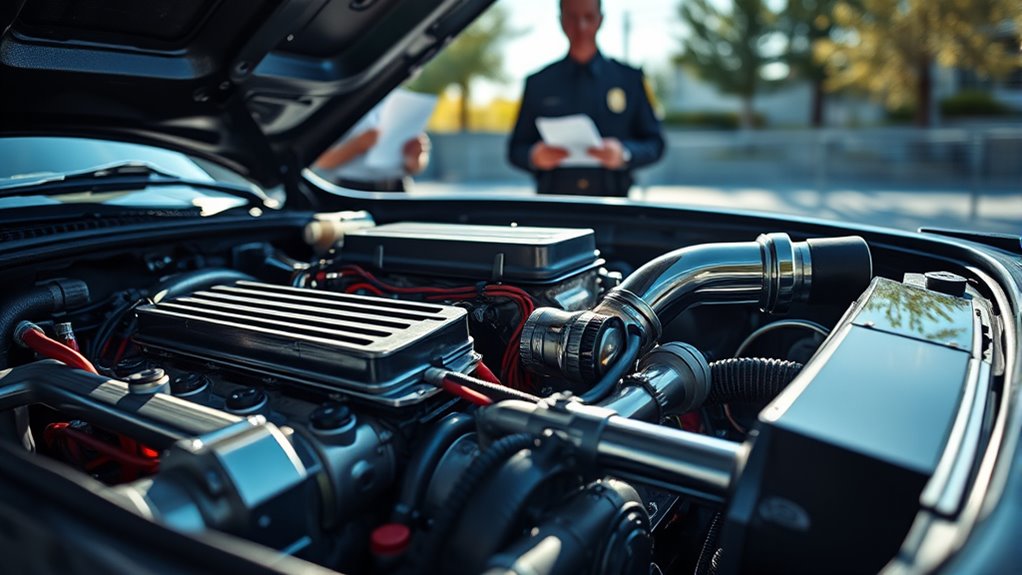
Failing to comply with engine modification regulations can lead to serious legal and financial consequences. You may face hefty fines, which vary by jurisdiction, and in severe cases, your vehicle could be impounded, causing inconvenience and additional costs. Insurance companies might deny claims related to non-compliant modifications, leaving you liable for damages. Environmental violations due to emission-related modifications can also result in legal action. Enforcement officers can inspect your vehicle and issue penalties on the spot, while courts may impose higher fines or order removal of illegal parts. You might receive demerit points that affect your driving record and privileges. Ultimately, the responsibility to ensure conformity rests with you, and failure to do so can considerably increase your financial and legal risks. Additionally, understanding regulatory compliance is crucial to avoid inadvertent violations and penalties. Being aware of vehicle emissions standards can help prevent violations that lead to legal issues. Moreover, staying informed about inspection procedures can assist in ensuring your vehicle remains compliant during official inspections.
Proper Documentation and Record-Keeping for Modifications
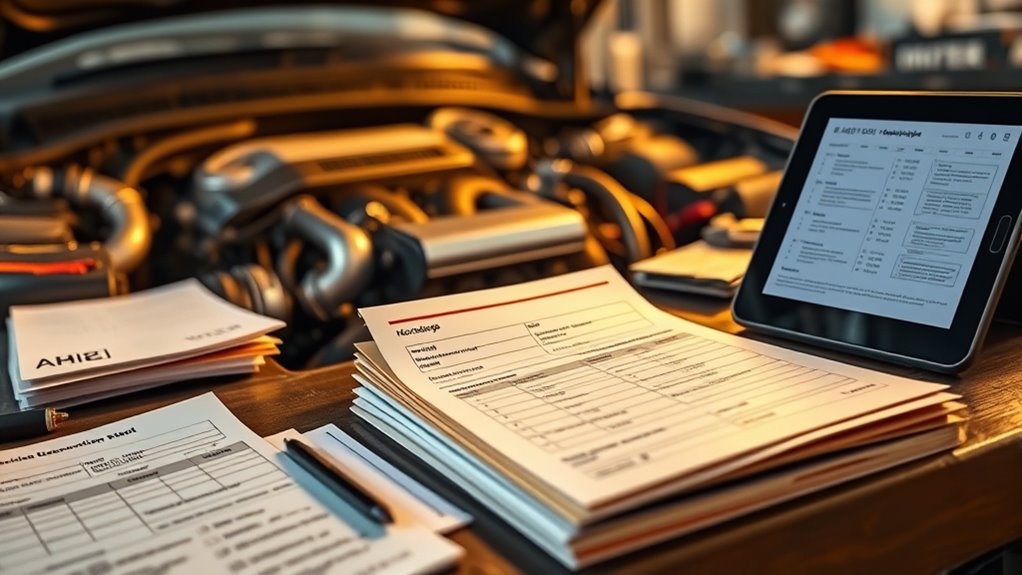
Proper documentation and record-keeping are essential to demonstrate that your engine modifications comply with regulatory standards. You must retain certified configuration documentation, such as EPA-approved design specifications and engine calibrations, to prove your setup matches approved models. For aircraft, logs and Form 337 records verify major repairs and modifications, including engine conversions. Maintaining detailed records of OEM instructions and certified parts ensures compliance, especially when using aftermarket components. Document any repairs or rebuilds following manufacturer guidelines, and keep proof of emissions-equivalent performance for aftermarket parts. For aircraft, logbook entries should reflect AD compliance and modifications. Keeping accurate, organized records helps demonstrate your modifications meet legal requirements, facilitates inspections, and protects you from potential penalties. Additionally, understanding vegetable juices and their benefits can support overall health during the modification process. Regularly updating your records and staying informed about regulatory updates will further ensure ongoing compliance and smooth inspection processes. Engaging with industry standards and best practices can further streamline your documentation efforts and ensure adherence to evolving regulations.
Best Practices for Ensuring Legal and Safe Modifications

Ensuring your engine modifications are both legal and safe requires careful planning and adherence to regulatory standards. First, verify emissions compliance by ensuring your conversion systems meet EPA or CARB regulations, especially if you’re installing aftermarket parts or converting newer vehicles. Always obtain necessary certifications like the EPA or CARB Certificate of Conformity before making modifications. Safety is equally important; avoid altering critical safety components such as brakes, tires, and lights, and ensure structural changes don’t compromise vehicle integrity. Check local, state, and federal regulations to stay compliant, including safety standards like FMVSS and emissions laws. Keep detailed records of all modifications, including receipts and certifications, to prove compliance during inspections or if questions arise. Following these best practices minimizes legal risks and enhances safety.
Selling Vehicles With Engine Modifications Legally

When selling a vehicle with engine modifications, it’s important to have thorough documentation to demonstrate compliance and protect yourself legally. Compile invoices, certifications, and engineering approvals for major modifications to prove legality and roadworthiness. Keep records of emissions compliance to meet state-specific standards, and retain proof of professional installation for non-DIY work. Be transparent by disclosing modification history in sales listings to prevent disputes. Verify that your vehicle complies with local laws, including exhaust noise limits, emissions regulations, lighting restrictions, and the legality of systems like nitrous oxide. To mitigate liability, include disclaimers in sales contracts and avoid selling unapproved modifications. Offering certification paperwork and maintenance records builds buyer trust, while clear disclosures about track-only mods prevent future legal issues.
Frequently Asked Questions
Can I Legally Modify My Vehicle’s Engine for Racing Purposes?
You can modify your vehicle’s engine for racing, but you need to follow specific laws. You must guarantee your modifications comply with federal and state emission standards, avoiding illegal removal of components like the catalytic converter. If you plan to use your vehicle on public roads, keep it street-legal by meeting noise and safety regulations. For track use only, make sure your modifications are permitted and don’t violate any local ordinances.
Are There Specific Permits Required for Engine Swaps in My State?
Imagine your engine swap is like assembling a complex puzzle—you need the right pieces and permits to complete it legally. In your state, some require specific permits or inspections, like California’s BAR Referee certification or Oregon’s emission checks. Check local laws before you start; otherwise, you risk fines or losing registration. Always guarantee your swap complies with state and federal regulations to keep your project on the right side of the law.
How Do I Verify if Aftermarket Parts Comply With Federal Standards?
You want to guarantee your aftermarket parts meet federal standards, so start by checking for third-party certifications like CAPA, NSF, or ISO 9001, which verify quality and compliance. Look for official labels such as EPA verification or CARB EO numbers on packaging. Use online databases from NHTSA, EPA, and CARB to confirm the parts’ approval status. Always keep manufacturer documentation that states compliance with relevant safety and emissions standards.
What Are the Penalties for Installing Illegal Emission Control Devices?
Did you know fines for illegal emissions device installation can reach $4,619 per violation? If you install such devices, you risk hefty penalties, both personally and financially. Authorities actively enforce these laws, targeting aftermarket defeat devices that bypass emissions controls. You could face significant fines, legal trouble, and contribute to environmental harm. Staying compliant is essential to avoid these penalties and help protect air quality and public health.
Does Modifying My Engine Affect My Vehicle’s Resale Value Legally?
Modifying your engine can impact your vehicle’s resale value legally because it may violate emissions or safety regulations. If your modifications aren’t compliant, potential buyers might be deterred, and your vehicle could face legal issues. To protect your resale value, verify your modifications meet local laws, keep documentation, and consider professional, reversible upgrades. Staying within legal boundaries helps maintain your vehicle’s appeal and value in the market.
Conclusion
By balancing laws, labeling, and logistics, you’ll breeze through your modifications without legal lapses. Keep records, stay informed, and guarantee your enhancements meet mandates to maintain your vehicle’s value and validity. Following these fundamentals fosters freedom from fines and friction, fueling your passion responsibly. Staying compliant isn’t just clever—it’s vital. Commit to cautious, compliant customization, and enjoy your engine’s enhancements with ease, excitement, and peace of mind.
